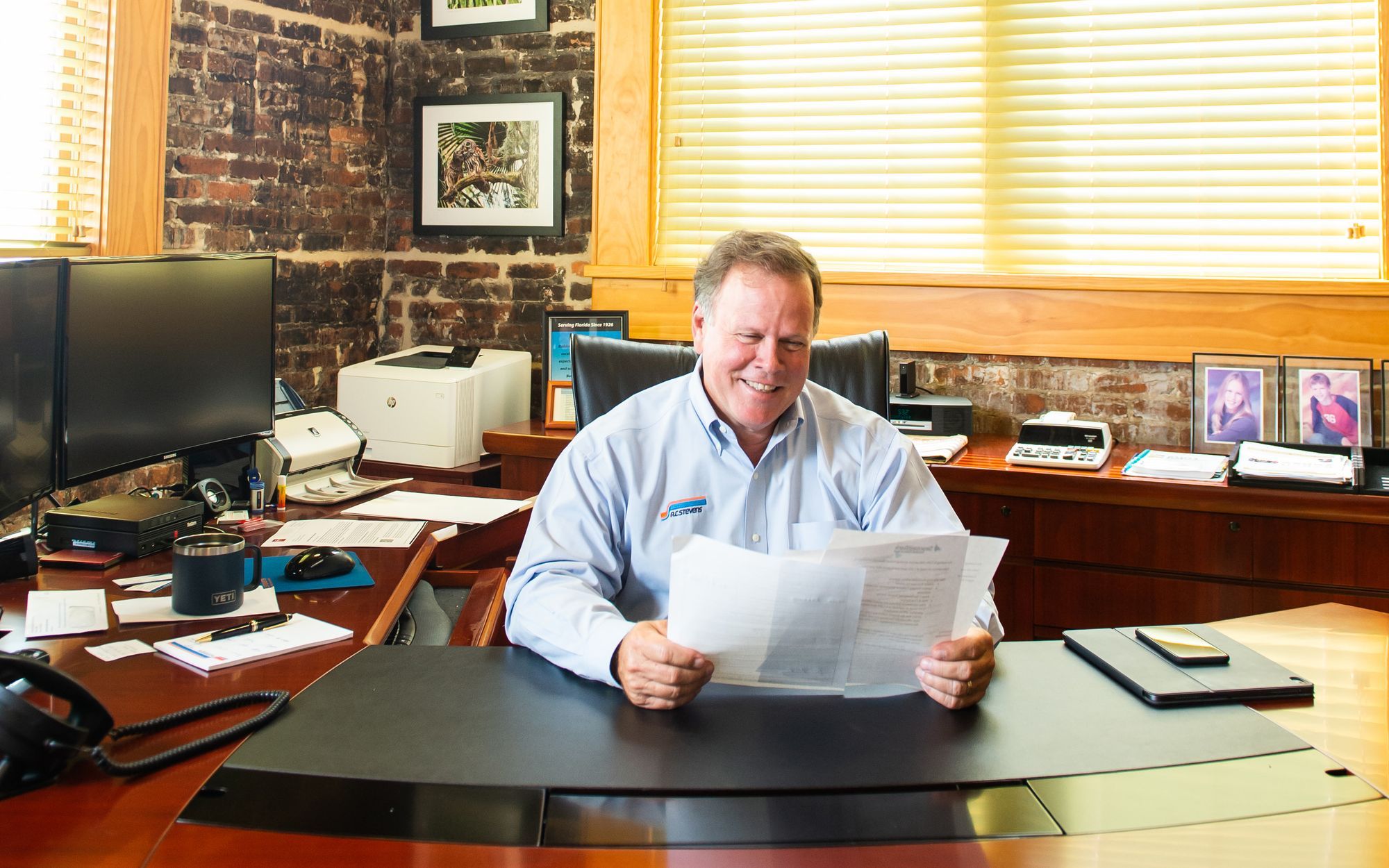Summing up the contributions and commitments—daily or annual—of Tim Keating is akin to a Herculean task. Besides his annual hiking or biking trips to areas like Yosemite, Iceland and Prague; his biannual honey collection from the five beehives on his property; the quarterly “attitude adjustment activities” he organizes for company employees; his leadership on six local and national boards; and his participation in large-scale church fundraisers—roasting 86 turkeys for Thanksgiving and basting 114 slabs of ribs each year in service to the community—besides all of that?
A well-known saying in the town of Winter Garden, Florida, just a 25-minute drive past scenic palm trees outside Orlando, is: “Let’s have Tim do it.” The “it,” of course, being whatever building needs construction, work or general oversight.
Performing as the third president and sole owner of R.C. Stevens, a design-build firm, Keating knows what it is to work from the ground upward. Keating’s father passed away when he was only 7 years old. As the oldest of four boys and the new man of the house, Keating developed a strong personality (his own admission) and the ability to make decisions quickly. After high school, he decided to skip college and support the household. Although his grandfather ran Keating Glass, a commercial glazer in town, he steered young Keating toward another company, landing him a “glamorous” position pulling weeds by a lake. He also spread large quantities of sand and dug footings for a prospective home with just a shovel and an axe. All this, Keating says, was a setup by his grandfather, hoping he would head to school instead.
It worked, and Keating’s choice of the University of Florida (Go, Gators!) allowed him to blossom. An early leader, Keating served as his fraternity’s president prior to his senior year and met Mary, his future wife. College is also where, like most, he fell in love with his future profession. “I studied architecture at first,” Keating admits. But, after working on a single project for an entire quarter, he remembers the professor’s discouraging evaluation—specifically, “I just don’t like it”—which inspired an immediate shift to majoring in building construction.
INTEGRITY, HONESTY, RESPECT
During summers, rather than return to weeding and spreading sand, Keating’s grandfather suggested a mutually beneficial internship with family friend Ray Stevens, a man successful enough to operate 20 drawing tables, philanthropic enough to build a community basketball court and foresighted enough to build his own house across the street from the headquarters of his company, R.C. Stevens, which was then in Orlando. Keating flourished under Stevens’ wing, learning key aspects of the business long before they were addressed in his college courses. Upon graduation, Keating was already a valuable player and was offered a position with a large firm—large enough that they operated two airplanes. But he couldn’t stay away for long, and on July 2, 1984, he officially joined the team at R.C. Stevens as a project manager and estimator.
Founded by Ray Stevens in 1926, the company was still fairly small when Keating took the reins in 1993. “For me to take the ball and run with it was fine, because I was very committed,” he says. Summing up his leadership style is easy for Keating: “Integrity. Honesty. Respect.”
And even though he’s made some upgrades over the years—relocating to Winter Garden; securing larger, more complex projects such as U.S. Sugar’s citrus processing plant; and shifting to efficient, paperless processing—Keating remains dedicated to those fundamental values, both preached and practiced at R.C. Stevens since the day it first opened its doors.
While the company typically concentrates on industrial and health care work, its leaders often go out of their way to help local clients and loyal friends. For example, during the recent office move and after newly inheriting leadership, Keating came upon decades-old receipts for work at the Roper property, which Stevens built for Winter Garden’s citrus pioneer Bert Roper. It was revealed that above and beyond building the residence, Stevens would repair the leaky roof, sooty chimney, cracked foundation or any other phoned-in requirements based upon that warranty never expiring. Following this weighty realization, Keating also stumbled upon the original plans for the founding family’s home and gifted them to the owners’ grandson. “That’s the type of company we are,” Keating says. “It’s integrity; doing what’s right when no one’s watching.”
Consistent dedication to detail and individualized service are not only critical fundamentals of Keating’s business; they are personal points of pride for R.C. Stevens’ president. “What gives me the greatest satisfaction is having a project come in on time, with no injuries, and a client asking for that superintendent or project management team again,” Keating says. “That’s who R.C. Stevens is—it’s not just ‘Tim Keating.’ I facilitate bringing it all together.”
ONE FOR THE TEAM
Keating relies on his people and provides an environment in which they can grow and thrive—a philosophy that stems from the simple fact that employees are “here more than they are at home,” he says. “We are nothing without our employees.” With just under 50 staff, about 20 of them in the office, Keating prioritizes intimacy and camaraderie. “I’m happy with the size of company we are because if someone has a personal problem, I can help them without fear of doing something for one and not doing something for another,” he says. “They all know I’m a human being and not just someone that sits in an office and makes rules.”
His ideals apply to fostering communication among employees, as well as inter-company policy. Collaboration is encouraged on a daily basis, to an extent that none of the offices (except his) have doors. “Whether in the office or in the field, whether you’ve been here for one year or 30 years, construction is still construction,” Keating says. “When people don’t collaborate, they miss out on the experience others have to offer.”
It’s a lead-by-example tactic that he established when he was a project manager. Beyond an ability to think on his feet, Keating was unafraid to approach a subcontractor and admit: “I don’t understand this part of the job. Can you walk me through it?” Establishing a rapport with superintendents and contractors who appreciated both the candor and the opportunity to flex their skills created connections that have benefited Keating in the long run. “Coming out of school doesn’t give you that knowledge, and the type of work we do is very technical,” Keating says. “It’s okay to say you don’t know, rather than trying to B.S. your way through it. I think that helped me grow as a leader.”
Besides an open-office environment, other R.C. Stevens policies include:
- An “employment wall” proudly depicting the headshots of all current company employees.
- Upgrading the previous, Coke-machine-sized breakroom to a café and bar, complete with Keurig machine, drip coffee and a beer tap.
- Quarterly activities, such as team bowling or backyard burgers at Keating’s home. Every Friday at 4 p.m., staff are encouraged to take a break for happy hour in the office café.
- A stint for all employees, field and leadership alike, at Rapport Leadership International in Las Vegas. Keating sends them through three intensive courses and used to “surprise” attendees by going to every single graduation, although his busy schedule these days means he isn’t able to make it to all of them.
- A livened workspace, complete with greenery and bright artwork.
- A health insurance plan with money back for participation in a “steps” wellness program. Keating is pleased that he has been able to get so much out of a plan considering they are not a hundred-million-dollar company, as he puts it.
Regardless of accomplishments, aptitude or employee gratitude, Keating remains humble in his description of his own contributions. While the saying around the office is “What Would Tim Do?” Keating’s preference is for his employees to talk with one another when they struggle with a decision, and then to think critically in order to arrive at a solution. In other words, “I want to empower them to think for themselves,” Keating says. “That’s how you grow as a person.”
A DAILY PRACTICE
Walking into Keating’s personal office, several sights attract the eyes. The building, built in 1912, shows off its original brick walls, complete with preserved soot from an early-20th-century fire. Sky-high wooden rafters rise above a shiny, L-shaped desk, and the walls are proportionately covered with well-chosen artwork, family photos and a set of stuffed ducks. One piece of artwork stands out from the bright colors and wood tones replete throughout the office space: a small, blank canvas, just behind Keating’s desk.
“That reminds me each and every morning to ‘paint my canvas,’” Keating explains. It’s a motto he developed while attending his own Rapport Leadership courses. While a simple reminder, it holds significance for Keating, who says the framed fabric “reminds me not to get stuck.”
In the next couple of years, Keating will complete his turn as an officer on ABC’s Executive Committee. While he has some large goals for his period as incoming chair—to improve perception of the construction industry, to be the mechanism that keeps members excited about association prospects, to have people go home safely at night, to get people clamoring to join the industry—his main intention is to “kick some ass!”
Waking up each day to paint his new canvas, and anticipating this new chapter, Keating is ready for the undertaking and any challenges it might present. “It’s up to me to do it,” he says.







